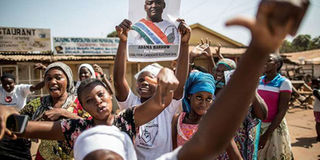Gambia strongman bows out after defeat as Ghana prepares for poll

People hold a banner picturing Gambia's opposition candidate Adama Barrow as they celebrate his victory during the Presidential Elections on December 2, 2016, in Serekunda. Jammeh followed with 43 per cent of the vote in Banjul. PHOTO | AFP
What you need to know:
- Jammeh took over the reins from founding president Dawda Jawara, who had ruled the country since independence.
- During the Thursday poll, he was attempting to win a fifth term with his Alliance for Patriotic Reorientation and Construction party.
In one of the most astonishing developments on the continent’s political scene, long-term Gambian ruler Yahya Jammeh on Friday confounded friend and foe when he conceded defeat in the presidential election held on Thursday.
It was even more intriguing, going by the fact that just days before the election, President Jammeh said his victory was all but assured.
For good measure, amid a blanket ban on the internet and international phone calls, he told the opposition and civil society and activists that protests over the election result would not be tolerated, saying post-election demonstrations were “loopholes used to destabilise African governments”.
“Our electoral system is fraud-proof and rig-proof. You cannot rig our elections. There is no reason anybody should demonstrate,” he proclaimed at his final campaign rally.”
Having seized power in a 1994 coup at only 29, Jammeh took over the reins from founding president Dawda Jawara, who had ruled the country since independence.
Though he pledged to root out corruption and hold elections, President Jammeh ended up ruling The Gambia with an iron fist for the next 22 years.
During the Thursday poll, he was attempting to win a fifth term with his Alliance for Patriotic Reorientation and Construction party.
Known to be a devout Muslim, Jammeh shared many characteristics with a cabal of African dictators — past and present — and certainly did not show much propensity for democratic ideals.
Whereas not as brutal as the likes of Jean-Bedel Bokassa of the Central African Republic, Equatorial Guinea’s Francois Marcias Nguema or Uganda’s Idi Amin Dada, Jammeh for sure shared some of their eccentricities and had a knack for holding onto power.
After giving up his military rank of colonel, Jammeh contested elections and — as expected — swept the presidential polls in 1996 and 2001.
Following a 2002 constitutional amendment removing term limits, he was set to win the presidency again 2006 and 2011.
GREAT VICTORY
Along the way, His Excellency Sheikh Professor Alhaji Doctor Yahya Abdul-Azziz Jemus Junkung Jammeh Naasiru Deenhe made the world’s headlines after declaring Gambia an Islamic republic and was in the limelight again after coming up with a concoction for what he said was a herbal cure for HIV/Aids.
Later, he withdrew his country from the Commonwealth, terming the organisation neo-colonial.
He recently hit the headlines again when he withdrew his country from the International Criminal Court.
The resilient Jammeh was widely viewed as set to rule The Gambia for a long time to come, and is on record as having said he would govern for a billion years “if Allah willed it”.
That prospect has, unfortunately for him, has dissipated.
Evidently, Jammeh had not reckoned the might of a united and firm opposition.
Ultimately, he met his Waterloo in the person of opposition chief Adama Barrow, a real estate businessman.
Reportedly a husband of two and father of five, the political novice showed his mettle as soon as voting began.
According to the Gambian Independent Electoral Commission, Barrow surprisingly won nearly 50 per cent of the vote in capital Banjul’s three constituencies.
Jammeh followed with 43 per cent of the vote in Banjul — his traditional stronghold — as Mama Kandeh came a distant third with 7.6 per cent of the ballots cast in the capital.
By some strange coincidence the three top contenders for the presidency are 51, having been born in 1965, the year The Gambia won independence from Britain.
Even as the unexpected Gambia poll saga unfolded, Ghana which is regarded as one of Africa’s longest-established multi-party standard bearers, was putting final touches for presidential and parliamentary elections scheduled for Wednesday.
DIFFERENT NARRATIVE
Ghana is expected to avoid the pitfalls that have recently marred elections in Uganda, Gabon and Zambia.
According to the country’s constitution, should the leading presidential candidate fail to garner more than 50 per cent of the vote, a runoff would be held four weeks after the first round.
The presidential poll, which comes after a tough campaign, pits incumbent John Dramani Mahama of the National Democratic Congress against veteran foe and main challenger Nana Addo Dankwa Akufo-Addo of New Patriotic Party.
Nana Konadu Agyeman Rawlings — the wife of former head of state Jerry Rawlings — will represent the National Democratic Party.
Other candidates are Paa Kwesi Nduom (Progressive People’s Party), Ivor Kobina Greenstreet (Convention People’s Party) and Edward Nasigri Mahama (People’s National Convention party).




